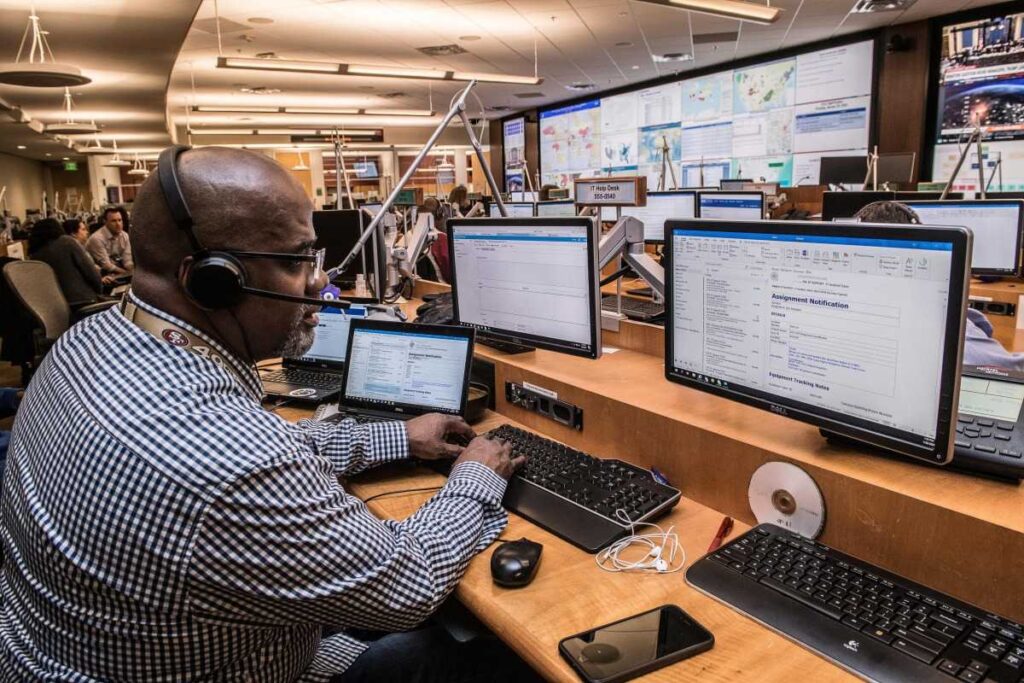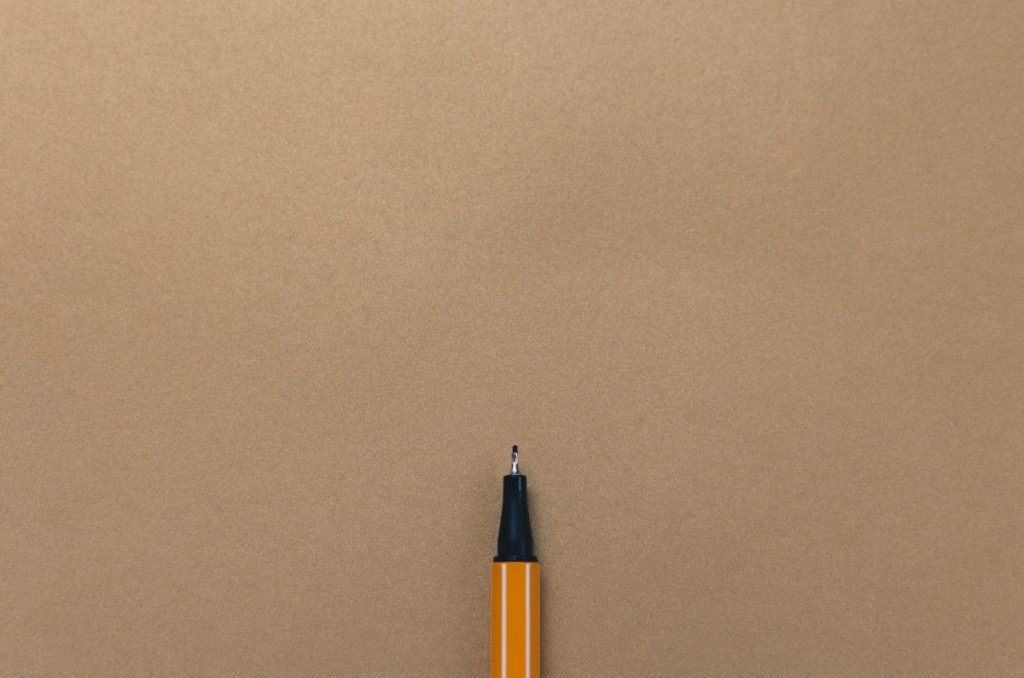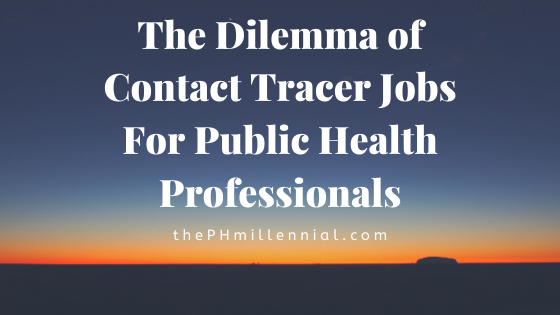If you are in the public health field or just looking for a job, I’m sure you’ve seen a plethora of contact tracing positions popping up.
Contact tracing has been at the forefront of conversations around COVID-19. The ideas around contact tracing and privacy concerns will continue to bring up the conversation of privacy.
10,000s of people are being trained and hired into contact tracing positions all around the US. With the hope that this will allow the states to target and isolate cases and keep the economies open. How effective will the US be at contact tracing?
Support The Public Health Millennial: https://www.buymeacoffee.com/thephmillennial
(Related: How To Search For Jobs During COVID-19)

What is Contact Tracing?
Contact tracing also known as a “disease detective” is a process for identifying people that have come into contact with an infected person. Then information and directions are given by the contact tracer and if more help is needed a social worker is present to case manage and get the person linked to a test or other services.
In some states, the protocol is to follow up with high-risk patients in 7 and 14 days.
Contact tracing has been used for HIV in the 1990’s and other STI’s. You may think of this as finding out everyone the person had sex with and notifying their partner that they have HIV. Contact tracing is very common when dealing with communicable diseases. Currently, contact tracing has become a huge tool that many countries have used around the world to flatten the curve.
However, contact tracing is being done in various ways around the world. Contact tracing is most successful when the person adheres completely to the protocol and 100% self-quarantines.
What makes contact tracing so successful?
To combat COVID-19 countries are using three main strategies
- Test – High number of testing per capita
- Identify – Contact Tracing done effectively
- Isolation – Self quarantine
As states open back up contact tracing is going to be at an all time high and compliance will be necessary.
This means that a contact tracer contact someone they pick up the phone and once they do that then follow the advice given.
Countries where contact tracing has been successful – China, South Korea, Singapore, Turkey – they take it a step further.
China being an authoritarian state uses its surveillance network (video cameras with face recognition, and mobile phone tracing) to conduct contact tracing. Chinese surveillance systems are also used to ensure that persons stick to their self-quarantine orders. They also have AI tech powered robots being used in hospitals to decrease infections as well as check person’s temperatures.
South Korea has been using a cell phone that has to be downloaded when entering the country to report any symptoms to authorities. South Korea has been very effective in containing and slowing the outbreak. If someone has a suspected or confirmed case of COVID-19, then cell phone and credit card data is used to track everywhere that person has been lately and every other person they have come close to. The system is so effective it can find out the contacts for the person the initial person was close to and alerts the authorities. This gives a much better idea of who needs immediate testing or needs to perform self-quarantine and reduces the time needed for contact tracing to take place. In South Korea, there are also apps that will notify you with information of confirmed cases and locations if in your neighborhood.
Turkey been contact tracing since their first case in march. They have adapted a system initially used for tracking measles for COVID-19. The contact tracing done in Turkey is a lot more active than in the US where they actually have contact tracers in full personal protective equipment go out to contacts and test them. Even if someone test negative, they are asked to stay home for 14 days which has been adhered to generally well. Which has helped slow the spread of COVID-19 in Turkey.
This type of diligent and systemic contact tracing has been very successful as it is able to stop the spread of COVID-19 at as many sources as possible.
(Related: What is Health Equity?)

Why this type of contact tracing won’t happen in the US?
Firstly, the technological techniques being employed by countries like China and South Korea have a completely different mindset to Americans. It is becoming more clear that many Americans will never want to give their data over for greater public health needs. There is no way that
Though Google and Apple have been working on phone apps to help with contact tracing in the US, these are going to be opt-in systems. Therefore the amount of users and data will not be inclusive of the entire population which will leave this system being a lot less effective than in other countries.
The type of contact tracing being used in the US is mainly phone calls with follow ups with social workers if necessary. Americans have distrust with phone calls because of the large and annoying tele-marketing industry. So Contact tracing in the US is completely voluntarily by each individual and the advice given is never a requirement but more of a suggestion. If you’ve seen the news lately, there have been so many anti-lockdown protest, massive gatherings on beaches, etc.
If there is one thing that American’s believe is that they have the right to do whatever they want in this “free nation.” This is truly sad because if there was an appreciation for the bigger public health issue here then the problems can be attacked directly. The lack of leadership has not made this any easier in the US. From the beginning the president of the US has been calling the pandemic a democratic hoax, not worse than the flu and refuses to wear a mask. If you are like me in a Republican strong region, then you would see masses of people not taking protective measures – wearing mask – when shopping or going about their daily life. So what is there that says any of the people believing that COVID-19 is not real will listen to anything a contact tracer has to say?
| Country | Confirmed Cases | Deaths | Case Fatality | Deaths/100K population |
|---|---|---|---|---|
| US | 1,643,246 | 97,720 | 5.9% | 29.87 |
| China | 84,095 | 4,638 | 5.5% | 0.33 |
| South Korea | 11,206 | 267 | 2.4% | 0.52 |
| Turkey | 156,827 | 4,340 | 2.8% | 5.27 |
| Italy | 229,858 | 32,785 | 14.3% | 54.25 |
Privacy Concerns
The biggest concern the US has is privacy concerns.
As technology companies step in to try to enhance the US contact tracing capacity, people all around the country do not want to share their personal information with anyone as they believe there are nefarious reasons behind it. There is great distrust for the government having resident data and how that can be used. This is a legitimate fear and one that needs to be taken seriously. I wouldn’t want the government to collect and keep my personal data even if its for greater public health and safety. Approaching this privacy conversation is going to be ever more important as ‘big data’ can be a very useful tool to fight off this pandemic.
Experts say that this pandemic will test privacy laws in the US and around the world.
In the case of smallpox in the US, there was a case in Massachusetts: Jacobson v. Massachusetts. Briefly, this is where Jacobson argued that having to take the small pox vaccine was unconstitutional. However, the court decided that the state is able to extend its power because of public health needs. So we will have to see what comes of this pandemic right now as well as when a vaccine is available.
It seems the battle with the coronavirus will continue when the vaccine is available with comments like:
- “This hoax was all to collapse the economy, blame Trump, and to push their patented quantum dot ID chip through vaccines.”
- “My Rights don’t end for nothing!!! And I will exercise 2A on all contact tracers !!! You are WARNED!!!”
- “When you put “safety” before your Freedom, you get neither.’
With many comments like this one, public health is going to be in an uphill battle from now until after a vaccine is created. The statements above are in direct contrast to a Chinese resident who could not go to work because his app didn’t clear his: “Although, it is not really reasonable, it is still a preventative measure.”
I do concede that there are widely varied views on COVID-19 and the government and public health role in it. Data concerns are important as we don’t want our private information being used for the wrong reasons – as is the case in the Cambridge Analyticca scandal.
(Related: What To Do In Times Of Uncertainty | COVID-19)
Contact tracing capacity?
Another thing to consider is the capacity that is needed to properly do contact tracing.
In Wuhan, China there are 11 million residents and at the peak of their infections had 9,000 contact tracer to resident which is a ratio of 81 contact tracers per 100,000 residents. Wuhan has been able to use this to drastically slow the spread of COVID-19 after being the epicenter early on in the pandemic outbreak.
Different states has been requesting different amounts of contact tracers to combat COVID-19. In Massachusetts they have gotten wanted to hire 1,000 contact tracers for a ratio of 14.5 contact tracers per 100,000 residents. While California is looking to hire up to 20,000 contact tracers equaling a ratio of 50 contact tracers per 100,000 residents. As you can see these ratios are way below the capacity that Wuhan had used to contain their infection outbreak. Not to mention the use of their surveillance system to help in this tracking, which the US doesn’t have.
That being said, contact tracing is going to be needed for the next 12-18 months. This capacity is likely to increase before the yearend. If that needed capacity will be needed is unknown.
Other Thoughts
In chatting with a friend in a contact tracing position she alerted me of some other concerns with the US contact tracing. She recently got her MPH and is now a contact tracer. She doesn’t believe she or the other people have gotten adequate amounts of training. She also thinks that their is going to be poor reporting consistency from the lack of training – people using different classifications for the same issue.
Some other reasons mentioned were:
- People don’t trust the government
- Working with undocumented immigrants is tricky
- Basically working against the governments that are reopening the states
There are so many unanswered questions. Though contact tracing is important, I’m afraid their needs to be better systems in place to combat this pandemic.
My Issue With this COVID-19 Contact Tracing Certification
There is this COVID-19 contact tracing certification that John Hopkins University and other places are offering. The course is free, but if you want to show you completed it and get a certification you have to pay $50. I honestly am bewildered by just how poorly a coordinated response around this was.
The US knew COVID-19 was coming. It came and classes went online. We knew that contact tracing is going to be hugely beneficial in stopping the spread in March if not earlier. We knew that there is going to be a need for people being trained in contact tracing. This is going to be an issue for the next 12-18 months at least. Yet, I have yet to hear a university who has paid for this course for their public health students (whether bachelors or masters). I truly find this disgraceful and shows the lack of care and coordination that could have been developed to address this virus head on.
The government should have paid for every single graduating public health student to get trained in this. A system could have even been set up to allow for students to opt in and take on contact tracing. This would have led to a coordinated and much more timely and robust response to COVID-19. It truly is amazing with everything going on in the economy, the fee was not waived for public health professionals do get this certification. Can we talk about equity?
My Thoughts on Contact Tracing
I do not think contact tracing is a career or a long time job. That being said, it can be a great means for public health professionals (and others) to get involved and learn some skills while helping to fight a global pandemic.
The qualifications for contact tracers varies state to state from just a high school diploma to a bachelors in some places. The pay also ranges from state to state from $16-$30 as I’ve seen. This is a great way to get your foot into the public health world especially as unemployment skyrockets.
The contact tracing methods utilized in the US are far from optimal. However, increasing this capacity and having the workforce available especially as states see spikes with the re-opening of the economy is going to be important. Contact tracers are going to be important positions moving into 2021.
The obvious downside is that these are short term contract positions. Meaning after your contract is done you may not be able to find a job as the employment market has drastically decreased because of COVID-19. I do believe that they will be offering contract extension as they deem necessary to keep up with capacity needs of contact tracers.

Summary
Contact tracing is a hugely necessary part of the COVID-19 pandemic response. Though the US contact tracing techniques are not the most optimal, they are needed to ensure that we can adequately respond to the COVID-19 outbreak.
The lack of leadership and coordination has left the US scrambling to approach the pandemic in a proper fashion. There is also an inherent risk or worry about privacy concerns around using big data to approach the COVID-19 pandemic.
Contact tracing jobs are going to be around for at least the near future. If the vaccine is fought against by a decent amount of people contact tracing may have to continue into 2022 and into the future.
What are your thoughts on contact tracing in the US?



